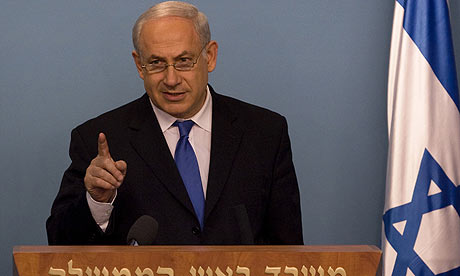
Relations between Israel and the US took another turn for the worsetoday after the Israeli prime minister, Binyamin Netanyahu, cancelled a trip to Washington next week amid reports that Barack Obama's administration is seriously considering a Plan B for a Middle East peace settlement.
An Obama administration official said that the preference is still for talks between Israel and the Palestinians but admitted that if that failed, it will look at alternative options, including Obama setting out his own Middle East proposal for a comprehensive peace deal.
A group of senior foreign advisers, including former national security advisers Brent Scowcroft and Zbigniew Brzezinski, who give informal advice to the White House at regular meetings, recommended recently that if the attempts to get the Israeli-Palestinian talks under way continued to be stalled, the US should impose its own plan.
Netanyahu had been dithering over whether to attend a 47-nation summit in Washington next week to discuss nuclear weaponsproliferation. His office announced in the middle of the week that he would be attending but on Thursday reversed this. His deputy, Dan Meridor, is to attend in his place.
An Israeli official said it was because Turkey and Egypt and other Muslim nations intended to raise questions about Israel's nuclear weapons.
Relations between Netanyahu and Obama have been tense because the Israeli prime minister refuses to provide concrete assurances that Israel will stop building Jewish settlements in East Jerusalem, a Palestinian pre-condition for beginning talks.
Obama's national security adviser, General Jim Jones, briefing reporters yesterday on a flight back to Washington from the Prague nuclear treaty signing, expressed disappointment that Netanyahu would not be present but said he understood that he had other commitments related to Holocaust Day events.
Asked about a US Plan B for an Israeli-Palestinian peace settlement, Jones said no decision had been taken and the White House remained committed to trying, firstly, to get indirect talks – "proximity" talks – under way that would, hopefully, lead to direct talks.
When a reporter said it sounded as if Plan B was under consideration, Jones said: "The idea of a US plan has been talked about for years. It's not something new. But there will be no surprise to any of the participants at all. So we're focused on the resumption of the talks. The best way to help us in our collective goals is to restart the peace talks. It will also help us in what we're trying to achieve with Iran."
An Obama administration official, speaking on condition of anonymity, said there was a genuine reluctance to go down the route of presenting a US peace plan because it was difficult to impose a deal on two antagonists. He said there was a problem because some Palestinians and Arab countries assumed that Washington was going to do this and had discounted going into proximity talks.
Avner Cohen, author of Israel and the Bomb, interviewed on RT America, criticised Netanyahu for not attending the summit. "I think it is silly, an unfortunate decision," he said, adding that the prospect of Muslim nations raising Israel's nuclear capability was not a reason not to attend.

No comments :
Post a Comment